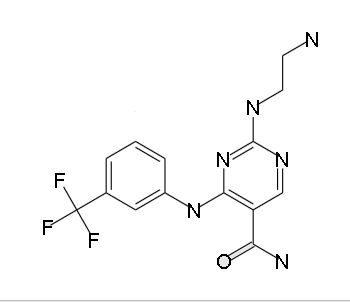
Syk Inhibitor II
CAS No. 726695-51-8
Syk Inhibitor II( —— )
Catalog No. M17582 CAS No. 726695-51-8
Syk inhibitor II, a cell-permeable, ATP-competitive, pyrimidine-carboxamide compound, selectively and reversibly inhibits Syk (IC50 = 41 nM).
Purity : >98% (HPLC)
 COA
COA
 Datasheet
Datasheet
 HNMR
HNMR
 HPLC
HPLC
 MSDS
MSDS
 Handing Instructions
Handing Instructions
| Size | Price / USD | Stock | Quantity |
| 5MG | 60 | In Stock |


|
| 10MG | 113 | In Stock |


|
| 50MG | 295 | In Stock |


|
| 100MG | Get Quote | In Stock |


|
| 200MG | Get Quote | In Stock |


|
| 500MG | Get Quote | In Stock |


|
| 1G | Get Quote | In Stock |


|
Biological Information
-
Product NameSyk Inhibitor II
-
NoteResearch use only, not for human use.
-
Brief DescriptionSyk inhibitor II, a cell-permeable, ATP-competitive, pyrimidine-carboxamide compound, selectively and reversibly inhibits Syk (IC50 = 41 nM).
-
DescriptionSyk inhibitor II, a cell-permeable, ATP-competitive, pyrimidine-carboxamide compound, selectively and reversibly inhibits Syk (IC50 = 41 nM).
-
In Vitro——
-
In Vivo——
-
Synonyms——
-
PathwayCell Cycle/DNA Damage
-
TargetDNA/RNA Synthesis
-
RecptorSyk
-
Research Area——
-
Indication——
Chemical Information
-
CAS Number726695-51-8
-
Formula Weight340.3
-
Molecular FormulaC14H15F3N6O
-
Purity>98% (HPLC)
-
SolubilityIn Vitro:?DMSO : 5 mg/mL (14.69 mM)
-
SMILESNCCNC1=NC(NC2=CC(C(F)(F)F)=CC=C2)=C(C(N)=O)C=N1
-
Chemical Name——
Shipping & Storage Information
-
Storage(-20℃)
-
ShippingWith Ice Pack
-
Stability≥ 2 years
Reference
1.Hisamichi H,etal.Synthetic studies on novel Syk inhibitors. Part 1: Synthesis and structure-activity relationships of pyrimidine-5-carboxamide derivatives.Bioorg Med Chem. 2005 Aug 15;13(16):4936-51.
molnova catalog



related products
-
Sempervirine
Sempervirine can unwind circular DNA, it shows selective inhibition of in vitro synthesis of cancer DNA .
-
CCG-203971
CCG-203971 is an inhibitor of SRE activation in the prostate cancer cell line PC-3 (IC50: 6.4 μM), with 87% inhibition of SRE activation achieved at 100 μM.
-
5-Fluoroorotic acid
5-Fluoroorotic acid is an inhibitor of thymidylate synthase. 5-Fluoroorotic is a selective agent in yeast molecular genetics.5-Fluoroorotic possesses a well-expressed anticandidal effect close to that of 5-fluorocytosine, as well as moderate antidermatophytal effects.



 Cart
Cart
 sales@molnova.com
sales@molnova.com


